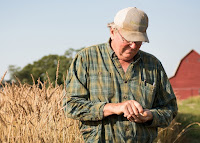I first heard about The Bread Lab from reading a New York Times article three years ago describing it as a "project to reinvent the most important food in history." It depicted Dr. Stephen Jones, the lab's founder, as looking like "a lovably geeky high school teacher," albeit one bent on nothing less than a revolution in how we think about bread.
From the article:
"What most people picture when they think of flour—that anonymous chalk-white powder from the supermarket—is anathema to Jones. Before the advent of industrial agriculture, Americans enjoyed a wide range of regional flours milled from equally diverse wheats, which in turn could be used to make breads that were astonishingly flavorful and nutritious. For nearly a century, however, America has grown wheat tailored to an industrial system designed to produce nutrient-poor flour and insipid, spongy breads soaked in preservatives. For the sake of profit and expediency, we forfeited pleasure and health. The Bread Lab’s mission is to make regional grain farming viable once more, by creating entirely new kinds of wheat that unite the taste and wholesomeness of their ancestors with the robustness of their modern counterparts."The Bread Lab's Dr. Stephen Jones.
In the intervening years since that article was written, Jones's project, part of Washington State University's College of Agricultural, Human and Natural Resource Sciences, has achieved national and international recognition for breeding, testing and rejuvenating forgotten varieties of wheat, barley, buckwheat and rye. It's also helped improve the prospects of farmers in Washington's Skagit Valley, where Jones built his lab in order to be closer to the fields and the farmers who test the grains.
"We’ve seen the addition of seven new businesses and about 200 new jobs because of the Bread Lab," said Patsy Martin, director of the Port of Skagit. "Farmers are making a profit off their crops and value is being added to the crops by new businesses. It’s our goal to have the number of businesses continue to grow and add more good jobs. A resilient agricultural economy will keep the Skagit Valley unique, special and viable into the future."
Dave Hedlin of Hedlin Farms, a Bread Lab partner.
Today Clif Bar and Company, in association with King Arthur Flour, announced the funding of a $1.5 million endowment to enable the Bread Lab to continue its research breeding grains adapted to organic farming practices in perpetuity.
Matthew Dillon, Clif Bar's senior director of agricultural policy and programs (profiled recently here), said, "Public sector land grant universities like Washington State have seen their funding for organic agricultural research cut year after year at the state and federal levels. With the endowment, [Clif Bar and Company] is putting a stake in the ground for organic’s future because we believe the Bread Lab can improve the good that organic brings to farmers, consumers and the planet."
Video and photos from Clif Bar.










No comments:
Post a Comment